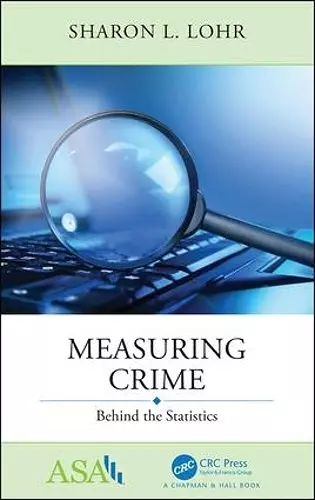Measuring Crime
Behind the Statistics
Format:Paperback
Publisher:Taylor & Francis Ltd
Published:29th Mar '19
Currently unavailable, our supplier has not provided us a restock date
This paperback is available in another edition too:
- Hardback£89.99(9780367192310)

Every day, newspapers, magazines, web sites, and social media feature articles about the prevalence of crime. Some of these contradict each other; others use inaccurate statistics. Many people who see wildly diverging statistics conclude that no statistics should be trusted. However, the essence of the statistical discipline is that all statistics should be accompanied by a measure of their accuracy. This book looks at crime statistics from a statistical point of view, and evaluates the different sources of crime statistics with respect to completeness (i.e. missing data), measurement error, and sampling variability. The goal of the book is to promote statistical reasoning about statistics.
"The book aims to achieve two goals: introduce statistical ideas to a general audience and provide an overview of US crime statistics. These are disparate topics, but in the way they are approached here, there is a strong synergy that reinforces both aspects. One the one hand, the reader's natural curiosity about crime (what is it, how are crime events classified and reported, how reliable are the numbers you see in the newspaper, etc.) will help him/her become interested in the statistical issues and learn these concepts in a practical and concrete setting. And on the other hand, by reading about the statistical issues surrounding crime data, he/she gains a better appreciation for the complexities of crime statistics, eventually acquiring a deeper understanding of them. As a statistician myself, I learned interesting facts about the types of crime, their nomenclature and the possible confusion surrounding them, and how the data are collected and reported. Overall, I think the combination is effective and very well developed in this book."
~Jean Opsomer, Westat
"This book is an excellent primer on handling the mass of data and information researchers are faced with. While it is geared toward followers of criminal justice information, much of the book is a very good introduction to survey techniques discussing their strong and weak points. Most importantly, there are very good guidelines and questions that one should employ before citing any data or using data for policy decisions or for reporting on data such as journalists do. The book is written in a non-technical manner and does a very good job of explaining the nuances in reviewing data. Any researcher who utilizes data would find this valuable. While it has specific examples in the criminal justice field, it really is quite useful for any user of data."
~Barry Nussbaum, former President American Statistical Association
"Measuring Crime: Behind the Statistics gives you the tools to interpret and evaluate crime statistics’ quality and usefulness while focusing on ways of thinking about crime statistics (not formulas!) and features: Eight questions you should ask before quoting a statistic; The two sources of information about homicide, FBI statistics with respect to what they measure; How victimization surveys can reflect experiences even though you were not asked to participate, special considerations when interpreting statistics about sexual assault and fraud; Examples of experiments and studies on how to improve crime statistics; Two online supplements containing additional details and links to data sources.
~Midwest Book Review
ISBN: 9781138489073
Dimensions: unknown
Weight: 253g
166 pages